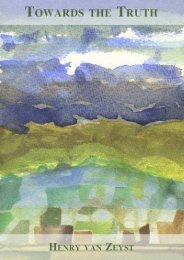Awareness in Buddhist Meditation
A detailed description of awareness in Buddhist Meditation.
A detailed description of awareness in Buddhist Meditation.
Create successful ePaper yourself
Turn your PDF publications into a flip-book with our unique Google optimized e-Paper software.
118<br />
true relationship, as all contact is with the m<strong>in</strong>d’s picture and the<br />
satisfaction of ‘self’.<br />
Love is not pleasure; but when we make it a pleasure as when we<br />
make love, then pa<strong>in</strong> is not very far away, the pa<strong>in</strong> of separation, of<br />
isolation, of opposition, of conflict. It is thought about love which<br />
gives pleasure <strong>in</strong> remember<strong>in</strong>g an experience. But that is not love.<br />
That memory, however pleasurable, is not love. Thought which is<br />
memory gives cont<strong>in</strong>uity; and that gives pleasure the moment after<br />
the experience is past. And because we want cont<strong>in</strong>uity, we employ<br />
memory to provide us that pleasure. But, what is a product of desire<br />
is not love. For, desire is based on choice which is conflict, which<br />
must lead to confusion and pa<strong>in</strong>. In desire there is opposition and<br />
separation, there is the ‘I’-concept want<strong>in</strong>g to achieve, to obta<strong>in</strong>, to<br />
possess.<br />
In possessiveness there is no love, no understand<strong>in</strong>g, but callousness<br />
and exploitation. We can make pleasure, but love must come<br />
to us. And it cannot come, when m<strong>in</strong>d is seek<strong>in</strong>g satisfaction, when<br />
memory is select<strong>in</strong>g and reject<strong>in</strong>g, when the heart is full of attachment<br />
to ‘self’. But, when thought is still and does not produce the<br />
images of tradition, of romance, of memory, of desire, then there<br />
will be calm without the agitation of selection, there will open receptivity<br />
without expectation, there will be an experienc<strong>in</strong>g of love<br />
without nam<strong>in</strong>g it, love without a lover.<br />
To f<strong>in</strong>d out what is love, religion, or anyth<strong>in</strong>g at all, one has<br />
first to remove the obstacles which prevent one see<strong>in</strong>g clearly. One<br />
cannot see what is happen<strong>in</strong>g outside as long as one looks through a<br />
w<strong>in</strong>dow with dirty or pa<strong>in</strong>ted glass. To have a direct perception and<br />
experience of love, one has to understand that as long as there is a<br />
motive, an <strong>in</strong>centive, a desire for oneself, there is no love. If there<br />
is a feel<strong>in</strong>g of hurt when one’s love is not returned or appreciated,<br />
then there is no love at all. Friendship, generosity, sympathy, which<br />
expect a response of like nature is self-centred and cannot be love.<br />
When there is hope and expectation, there is also fear <strong>in</strong> idealism;

















